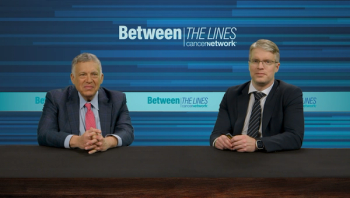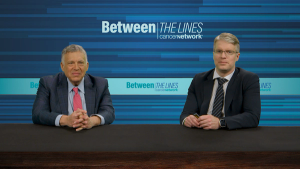
Experts discuss the benefits of combination therapies for non-small cell lung cancer, emphasizing improved survival rates and patient quality of life.

Your AI-Trained Oncology Knowledge Connection!


Experts discuss the benefits of combination therapies for non-small cell lung cancer, emphasizing improved survival rates and patient quality of life.

Explore the latest insights on combination therapies for metastatic cancer, focusing on long-term management and patient outcomes in challenging cases.

Health care professionals emphasize the importance of patient education on adverse effects of amivantamab and lazertinib to improve treatment adherence and outcomes.

Oncologists discuss effective strategies for safely implementing combination therapies while managing adverse events to enhance patient outcomes.

Experts discuss the efficacy of amivantamab and lazertinib in treating EGFR mutations, highlighting improved outcomes and reduced CNS metastases.

The experts focus on clinical trial evidence supporting the use of combination therapies in EGFR-mutant mNSCLC. The panel reviews key data from the MARIPOSA and FLAURA trials, highlighting differences in patient populations, CNS imaging protocols, and reported outcomes. They emphasize that routine CNS surveillance allows for a more accurate assessment of intracranial progression-free survival and can inform optimal therapy selection. MARIPOSA trial data demonstrate that amivantamab plus lazertinib significantly improves intracranial progression-free survival compared to osimertinib monotherapy, effectively doubling outcomes in patients with baseline brain metastases. The discussion also addresses the importance of patient stratification based on risk factors, including high tumor burden, liver metastases, p53 mutations, and circulating tumor DNA levels, which may impact prognosis and response to therapy. The panel emphasizes that combination therapy is beneficial across populations, not limited to high-risk patients, and stresses the significance of first-line therapy selection in improving long-term outcomes. Safety profiles and tolerability are also introduced, noting the need for patient education and shared decision-making.

This opening segment establishes the program’s focus on EGFR-mutant mNSCLC, emphasizing the importance of identifying high-risk patient populations and discussing new combination therapies. The panel introduces the challenges in managing patients with CNS metastases, highlighting the need for effective systemic treatments that also demonstrate intracranial activity. Key agents, such as osimertinib and combinations with amivantamab and lazertinib, are briefly introduced, demonstrating their potential to improve progression-free survival and overall survival. The experts discuss the critical balance between treatment efficacy and patient quality of life, noting the importance of considering performance status and potential adverse events when selecting therapies. This segment also highlights that treatment decisions should be individualized, incorporating shared decision-making with patients. The speakers stress that CNS monitoring and early intervention are increasingly essential, and combination regimens are being explored as first-line strategies to maximize long-term benefit.

Key AEs of NALIRIFOX in NAPOLI 3 were GI- and hematologic-related, with favorable rates of neutropenia and less growth factor use vs nab-paclitaxel/gemcitabine in mPDAC.

Martin F. Dietrich, MD, PhD, explains how NALIRIFOX dosing in the NAPOLI 3 trial resulted in lower rates of grade 3/4 neutropenia vs standard therapy for metastatic PDAC.

The NAPOLI 3 trial demonstrated that NALIRIFOX improved outcomes for patients with metastatic pancreatic ductal adenocarcinoma compared with the standard of care, nab-paclitaxel and gemcitabine.

Panelists discuss how overcoming resistance mechanisms in EGFR-mutated non–small cell lung cancer (NSCLC) remains a key unmet need, with future research focusing on targeting these mechanisms, exploring new drug combinations, and optimizing treatment sequences to improve patient outcomes.

Panelists discuss how the adverse effect profile of amivantamab plus lazertinib (ami-laz) compares with other combination therapies, emphasizing its balance between therapeutic efficacy and quality of life, and how this influences decision-making in treatment selection.

Panelists discuss how targeted cancer therapies, particularly those affecting the EGFR and c-MET receptors, present unique adverse effects such as dermatologic reactions and venous thromboembolism, emphasizing the importance of proactive management, patient education, and evolving treatment strategies to balance efficacy with quality of life.

Panelists discuss how intracranial progression-free survival (PFS) and duration of response (DoR) influence treatment decisions, highlighting the significance of intracranial data in differentiating this regimen within the treatment landscape, its potential impact on brain metastases management, and the role of radiation therapy in clinical practice.

Panelists discuss how the growing role of combination therapies in EGFR-mutated non–small cell lung cancer (NSCLC) influences the choice between the MARIPOSA and FLAURA2 trials, considering overall survival data, multidisciplinary implementation, patient education, and their impact on first-line prescribing decisions.

Panelists discuss how both chemotherapy-free and chemotherapy-containing combinations offer valuable treatment options for first-line EGFR-mutated non–small cell lung cancer (NSCLC) patients, with considerations including survival benefits, brain metastasis concerns, adverse effect profiles, and the evolution toward personalized treatment selection rather than viewing either approach as universally superior.

Panelists discuss how the significant overall survival (OS) benefit demonstrated by the new combination therapy (amivantamab-lazertinib) compared with standard monotherapy makes it a preferred treatment option for most patients despite a slightly increased toxicity and time commitment.

Panelists discuss how the treatment landscape for EGFR-mutated lung cancer has evolved, with 3 strong options now available, including single-agent osimertinib and 2 combinations: osimertinib plus chemotherapy (FLAURA2) and amivantamab plus lazertinib (MARIPOSA), with the latter showing significant overall survival benefits.

Explore the complexities of treating brain metastases in lung cancer patients, focusing on innovative systemic therapies and patient-centered approaches.

Healthcare professionals discuss the importance of individualized treatment plans for managing adverse events in patients undergoing cancer therapy.

Explore effective strategies for managing dermatologic adverse events in lung cancer patients, ensuring optimal care and patient comfort.

Medical oncologists discuss the overall research landscape in advanced EGFR-mutant NSCLC, highlighting exciting trials and emerging data in the evolving treatment space.

Martin Dietrich, MD, PhD, shares expert perspectives on recent data from TROPION-Lung05 and HERTHENA-Lung01 in advanced EGFR-mutant NSCLC.

Wade T. Iams, MD, provides clinical insights on proactive management strategies for patients receiving amivantamab for advanced EGFR-mutant NSCLC.

Focusing on treatment practices for patients with advanced EGFR-mutant NSCLC, Martin Dietrich, MD, PhD, discusses how the availability of subcutaneous amivantamab can potentially address current treatment barriers.

Wade T. Iams, MD, outlines insights gleaned from recently presented data from the PALOMA-3 trial in advanced EGFR-mutant non–small cell lung cancer.

Martin Dietrich, MD, PhD, discusses the secondary analysis from MARIPOSA evaluating first-line amivantamab plus lazertinib in patients with advanced EGFR-mutant NSCLC.

Following the 2024 ASCO Annual Meeting, medical oncologists share insights on how the availability of the FLAURA2 treatment regimen has impacted the treatment of patients with advanced EGFR-mutant non–small cell lung cancer (NSCLC).

The panelist summarizes the major findings from MARIPOSA-2 and their conclusions about amivantamab regimens improving outcomes in osimertinib-resistant NSCLC.

This segment summarizes the pivotal efficacy and safety outcomes from the MARIPOSA-2 trial of amivantamab-based regimens in osimertinib-resistant EGFR-mutant NSCLC. It explores the clinical implications of these data and potential future research directions.

Published: May 2nd 2025 | Updated:

Published: October 20th 2022 | Updated:

Published: August 10th 2022 | Updated:

Published: June 6th 2024 | Updated:

Published: August 18th 2022 | Updated:

Published: May 30th 2024 | Updated: